Destination Management Offices: A Light at the End of the Tunnel for the Tourism Sector in Lebanon
06/03/2023
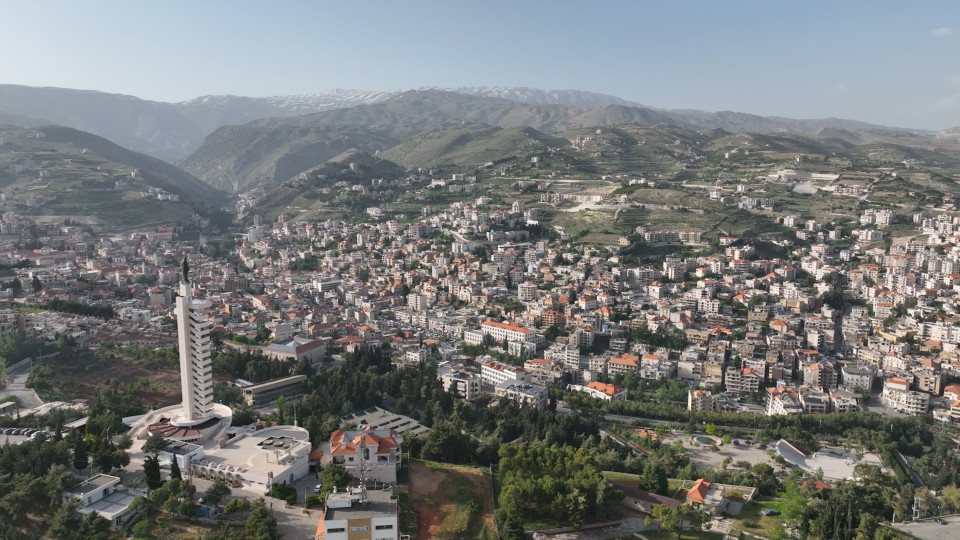
The financial crisis in Lebanon began in October 2019 having been caused by several factors that heavily impacted the country, including a decline in the overall economy, a large deficit in the trade balance, the disappearance of capital inflows, and others. One of the most significant events affecting Lebanese citizens is the closure of banks, which has resulted in no access to bank accounts, leading to uncertainty about the future of depositors’ accounts. Another event that has impacted Lebanon is the devaluation of the Lebanese Pound, which was previously pegged at 1,500 LBP but is now trading at around 85,000 LBP.
These factors have significantly impacted Lebanon’s tourism sector, which was previously a major component of the country’s GDP. Lebanon has a rich history, beautiful beaches, vibrant nightlife, and numerous religious tourist sites. However, due to the economic crisis and the devaluation, the cost of living has increased, reducing the purchasing power of local tourists. Ironically and despite this, tourism rose during summer and Christmas times due to Lebanese expatriates having access to fresh money, making Lebanese tourism more affordable for them. However, most Lebanese citizens cannot afford to travel or do local tourism due to their limited access to bank accounts.
For example, a hotel room in snowy regions of Lebanon during February 2023 costs an average of $250 per night, with a missing gap in product offerings for a budget of around $50-$75 per night. Rural areas of Lebanon could easily serve this market with a complete set of offerings that enriches the experience in the mountains instead of standard hotels.
Rural regions can develop a complete set of offerings that would enrich the unique touristic experience in the mountain and rural areas. For example, an agri-food cooperative can allocate space inside the village for tourists to sleep, a decent heated place then creates a tour within the village touching all the specifics of the village production, religious places, hiking, to have a rural experience teaching children in food production, and many other examples.
The potential of rural tourism in Lebanon is significant and can be leveraged by establishing destination management offices (DMOs) in each region. A DMO is an organization that promotes and manages a specific destination or region, with the main focus on promoting tourism, initiating economic growth, and enhancing the visitor experience. DMOs are considered a local economy based on tourism that brings revenue for local businesses and creates jobs for rural residents.
In addition to the above, DMOs can serve as a focal point for tourists and businesses in the area, ensuring that visitors have a positive experience. They can provide valuable information about the region, including historical sites, lodging, dining experiences specific to the region, and activity options. DMOs can also provide marketing and promotional services for local businesses and attractions, increasing their visibility and generating more business.
To succeed, a DMO should work with local governmental bodies such as municipalities and more importantly the Union of Municipalities of each region, cultural organizations, local NGOs, and others to facilitate the implementation, outreach, and support. The DMO can develop tourism strategies with these stakeholders to enhance the visitor experience, and promote sustainable tourism. The aim of the DMO is not to create new touristic sites or promote new hotels but more go to the rural experience by promoting guesthouses, local productions, local heritage components, and many others. The DMO will be providing exposure to all tourist institutions and does not allow the big players to take over or benefit solely from its services. The DMO will create and implement marketing campaigns to attract visitors, manage festivals & events, and play the role of information centers for that region in question. It will include developing programs to protect natural and cultural resources and promoting responsible tourism practices.
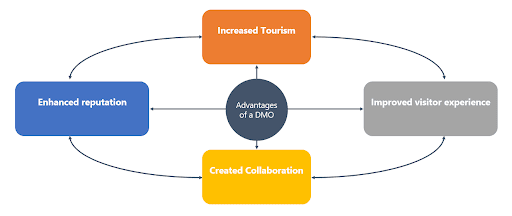
DMOs have several advantages, the most important ones as follows:
Increased tourism: it can attract visitors to the region in question, which can bring in revenue for local businesses and create jobs for rural residents. It will create value and enhancement at the level of the whole tourism value chain
Improved visitor experience: it can provide helpful and crucial information and services to the tourists, to enhance their experience and increase the likelihood that they will return in the future. The rural experience is unique to each region, so the better the experience is personalized to the region itself, the more value it provides to the tourists, and the more likely they will visit it again.
Enhanced reputation: it can help to build a positive reputation for the regional destination, which can attract additional tourists and enhance the overall image of the region in question.
Created collaboration: It will create some sort of dynamic and collaboration between all the stakeholders, working in one community, for the sole purpose of promoting their region. By doing that, the work is done at the level of the region and not benefiting one or a few large entities in a region. This kind of dynamic will be a first but will face some difficulties as tourism was never developed at the regional level but at the national level without the personalization and involvement of all the stakeholders that could benefit from such services.
One of the main key functions the DMO can provide are the following:
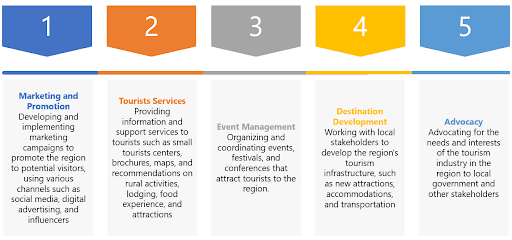
Despite the advantages of establishing destination management organizations (DMOs) in several regions of Lebanon, there are a few challenges that need to be addressed to ensure their success. One of the main challenges is funding, as the local government is currently unable to provide support due to its quasi-inexistent state. To overcome this challenge, a strategic approach can be taken by joining forces with international NGOs, private donors, and the local private sector. Involving the private sector in the region can boost the tourism sector, promote social and entrepreneurial engagement, and foster strong relationships between stakeholders. The financing of the DMO can be achieved through various means, such as through shares or other financial products, which can be explored in the future.
Another challenge is finding qualified staff who can handle the management and activities of the DMO. To address this, the DMO will need the support of a local NGO to develop capacity building and establish an internal career path with milestones and KPIs. Previously, engagement from stakeholders has been low, with most relying on the central government and the Ministry of Tourism. It is now necessary to shift the focus to the local government defined by the municipality or the union of municipalities. Although this step may have some bottlenecks, it is crucial to push forward the benefits that could come out of the DMO for all the beneficiaries involved.
To ensure that progress is being made, a Monitoring and Evaluation team should be created as part of the DMO to keep track of the work being done and to compare it with the KPIs established at the beginning. By addressing these challenges and taking a strategic approach, DMOs in Lebanon can be successful in promoting tourism, fostering engagement, and creating strong relationships between stakeholders.
Starting today, several regions in Lebanon can create a DMO, namely: Qobayat, Ehden, Becharreh, Tripoli, Batroun, Jbeil, Jounieh, Beirut, Chouf, Zahleh, Bekaa west, Baalbeck, Deir Al Ahmar, Saida, Tyr, Tebnine, and many others.
For example, for Zahleh, several pillars can the DMO be built on such as, namely: wine tours, arak tours, religious tourism (more than 55 churches, convents, etc.), food heritage, a UNESCO city of gastronomy, agriculture, historic sites, and many others. The availability of traditions in Zahleh, of small guesthouses or potential guesthouses, of agriculture cooperatives, of food processing cooperatives, makes it a great example of where the DMO can be easily created and implemented.
If Zahleh decides to create and implement a DMO, it will impact the following areas:
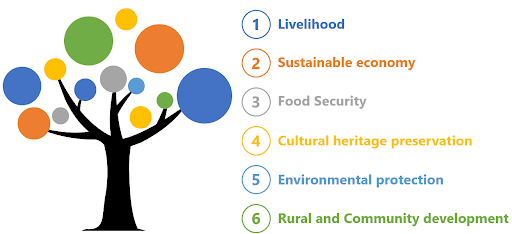
Livelihood: Tourism can become a weighty source of income for local communities, particularly in rural areas. The DMO will help promote local tourism businesses specific to the region in question, for example, in the Zahleh region, such as hotels, restaurants, and tour operators, and enable new opportunities for locals to take part in the tourism industry through activities such as gastronomy, cultural experiences, historical sites, and local crafts.
Sustainable Economy: The DMO will promote sustainable tourism executions that support a local economy in the long run. For example, a DMO can implement work closely with local communities to thrive responsible tourism practices that reduce the impact on the environment and promote conservation endeavors. It can also promote local sourcing of goods and services for the tourism industry from local shops, markets, and suppliers, which can support sustainable agriculture and local economic development instead of sourcing everything from big cities such as Beirut, Tripoli, and Saida.
Food Security: Tourism helps sustain local food value chains by creating demand for local produce and culinary traditions. It can be easily implemented with the intervention of local farmers and food producers to promote local heritage cuisine and create opportunities for tourists to run into local food and beverage offerings. This will eventually support and sustain the increase in demand for local food products, support local farmers and food businesses, and promote food security in the region.
Cultural Heritage Preservation: The DMO will play an important role in promoting cultural heritage preservation by working with the strategic local communities. It will do its best in identifying and preserving religious, cultural sites and activities. For example, the DMO can create a marketing campaign to promote local cultural activities of local heritage sites along with sustained support to restore historic buildings and landmarks.
Environmental Protection: The DMO can promote environmental protection by encouraging sustainable tourism practices that reduce the impact on the local environment. For example, the DMO can implement with local tour operators or directly themselves to promote responsible nature-based tourism, support the development of eco-tourism activities and initiatives, and promote conservation efforts such as beach cleanups or tree planting.
Community and Rural Development: The DMO can support community development by operating with local communities to pinpoint and address the region’s specific needs. For example, a DMO can develop tourism products through several existing cooperatives to support local community development initiatives. It can be done for example as community-based tourism activities, supporting local infrastructure development, such as roads and agriculture roads, and helping implement capacity-building sessions within the community that will support directly or indirectly tourism development. Another aspect that the DMO can do is to support rural development by promoting rural tourism and supporting the development of rural infrastructure. For example, a DMO can promote local products agri-food products and crafts from Micro SMEs, women cooperatives, and individuals. This will create very interesting opportunities for tourists to experience rural life, and support the development of local tourism businesses in rural areas.
In summary, with the caretaker government, with completed stopped institutions, the DMO can be a light at the end of the tunnel for the tourism sector in Lebanon through the reassignment of responsibilities and authorities from ministries towards the DMO that involves all the stakeholders of a region such as municipalities and Union of Municipalities, and the private sector. Some call it a hidden face for federalism, some others will call it decentralization, and we can call it a solution for tourism in Lebanon. The ease of doing of the DMO generally speaking is high with some challenges, especially in the collaboration between local government, the private sector, and NGOs.
Laurent-Marc Gharzani, MIA 09
Manager, Consulting services
LEAD Expertise sarl
Part of FTL Group
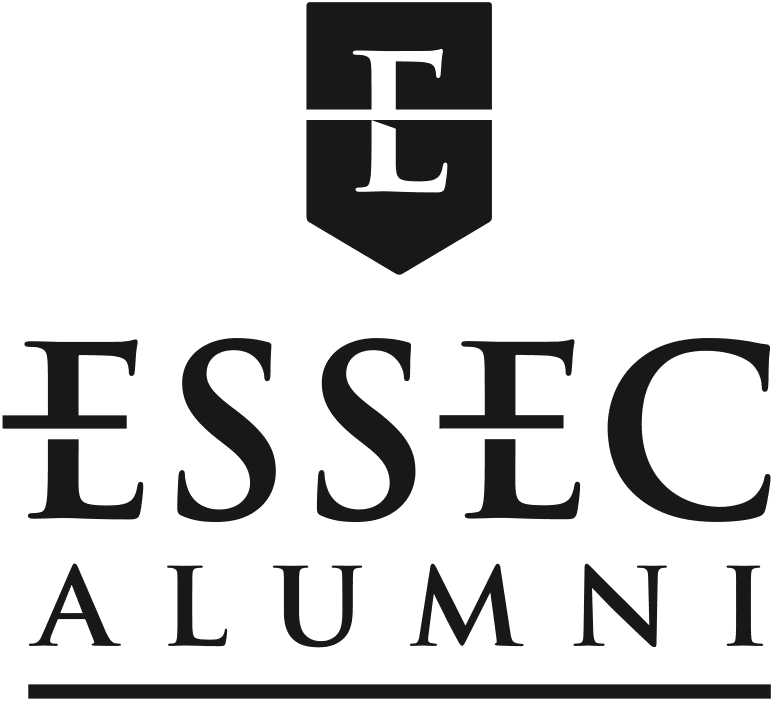
Commentaires0
Veuillez vous connecter pour lire ou ajouter un commentaire
Articles suggérés


